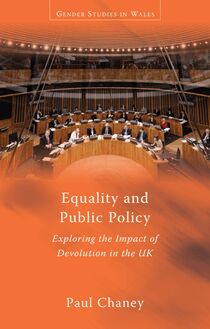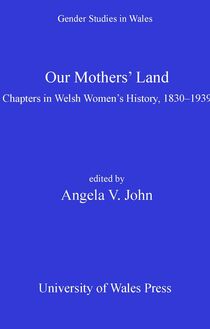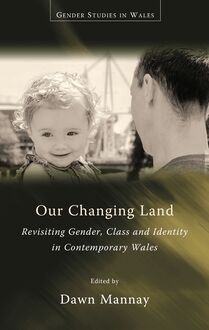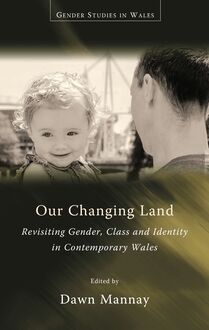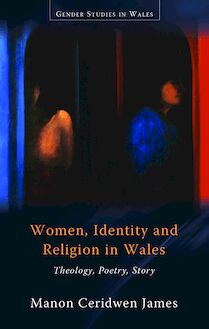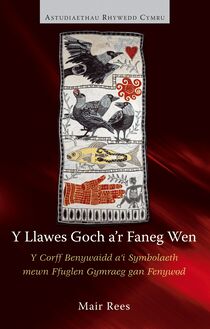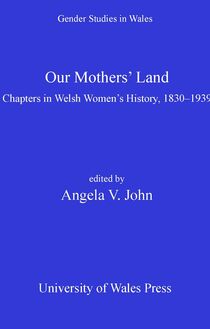-
 Univers
Univers
-
 Ebooks
Ebooks
-
 Livres audio
Livres audio
-
 Presse
Presse
-
 Podcasts
Podcasts
-
 BD
BD
-
 Documents
Documents
-
- Cours
- Révisions
- Ressources pédagogiques
- Sciences de l’éducation
- Manuels scolaires
- Langues
- Travaux de classe
- Annales de BEP
- Etudes supérieures
- Maternelle et primaire
- Fiches de lecture
- Orientation scolaire
- Méthodologie
- Corrigés de devoir
- Annales d’examens et concours
- Annales du bac
- Annales du brevet
- Rapports de stage
La lecture à portée de main
Vous pourrez modifier la taille du texte de cet ouvrage
Découvre YouScribe en t'inscrivant gratuitement
Je m'inscrisDécouvre YouScribe en t'inscrivant gratuitement
Je m'inscrisEn savoir plus
Vous pourrez modifier la taille du texte de cet ouvrage
En savoir plus

Description
The book subjects male characters in six south Wales novels written between 1936 and 2014 to detailed, gendered reading. It argues that the novels critique the form of masculine hegemony propagated by structural patriarchy serving the material demands of industrial capitalism. Each depicts characters confined to a limited repertoire of culturally endorsed behaviourial norms – such as displays of power, decisiveness and self-control – which prohibit the expression and cultivation of the subjective self. Within the social organisation of industrial capitalism, the working-class characters are, in practice, reduced to dispensable functionaries at work while, in theory, they are accorded the status of patriarchally-sanctioned principals at home. Ideologically subservient and ‘feminised’ in one context, they are ideologically dominant and ‘masculinised’ in another. As they negotiate, resist or strive to reconcile the irreconcilable demands of such gendered practices, recurring patterns of exclusion, inadequacy and mental instability are made evident in their representation.
Introduction
1. Dominant, Residual, Emergent: Forms and Formations of Male
Identity in Gwyn Jones’s Times Like These (1936)
2. Genre and the Tribulations of Masculinity in Lewis Jones’s
Cwmardy (1937)
3. Investigating Genre and Gender in Menna Gallie’s Strike for a Kingdom (1959)
4. Genre and the Embodied Male in Ron Berry’s So Long, Hector Bebb
(1970)
5. Patriarchy, Power and Politics: Masculinities in Roger Granelli’s
Dark Edge (1997) and Kit Habianic’s Until Our Blood is Dry (2014)
Conclusion
Bibliography
Sujets
Informations
| Publié par | University of Wales Press |
| Date de parution | 15 juin 2021 |
| Nombre de lectures | 0 |
| EAN13 | 9781786837806 |
| Langue | English |
Informations légales : prix de location à la page 0,1500€. Cette information est donnée uniquement à titre indicatif conformément à la législation en vigueur.
Extrait
REPRESENTING THE MALE
Gender Studies in Wales
Astudiaethau Rhywedd yng Nghymru
Series Editors
Dawn Mannay, Cardiff University
Rhiannon Marks, Cardiff University
Diana Wallace, University of South Wales
Stephanie Ward, Cardiff University
Sian Rhiannon Williams, Cardiff Metropolitan University
Series Advisory Board
Jane Aaron, University of South Wales
Deirdre Beddoe, Emeritus Professor
Paul Chaney, Cardiff University
Mihangel Morgan, Aberystwyth University
Paul O Leary, Aberystwyth University
Teresa Rees, Cardiff University
The aim of this series is to fill a current gap in knowledge. As a number of historians, sociologists and literary critics have for some time been pointing out, there is a dearth of published research on the characteristics and effects of gender difference in Wales, both as it affected lives in the past and as it continues to shape present-day experience. Socially constructed concepts of masculine and feminine difference influence every aspect of individuals lives; experiences in employment, in education, in culture and politics, as well as in personal relationships, are all shaped by them. Ethnic identities are also gendered; a country s history affects its concepts of gender difference so that what is seen as appropriately masculine or feminine varies within different cultures. What is needed in the Welsh context is more detailed research on the ways in which gender difference has operated and continues to operate within Welsh societies. Accordingly, this interdisciplinary and bilingual series of volumes on Gender Studies in Wales, authored by academics who are leaders in their particular fields of study, is designed to explore the diverse aspects of male and female identities in Wales, past and present. The series is bilingual, in the sense that some of its intended volumes will be in Welsh and some in English.
REPRESENTING THE MALE
Masculinity, Genre and Social Context in Six South Wales Novels
John Perrott Jenkins
John Perrott Jenkins, 2021
All rights reserved. No part of this book may be reproduced in any material form (including photocopying or storing it in any medium by electronic means and whether or not transiently or incidentally to some other use of this publication) without the written permission of the copyright owner except in accordance with the provisions of the Copyright, Designs and Patents Act. Applications for the copyright owner s written permission to reproduce any part of this publication should be addressed to the University of Wales Press, University of Wales Registry, King Edward VII Avenue, Cardiff CF10 3NS.
www.uwp.co.uk
British Library Cataloguing-in-Publication Data
A catalogue record for this book is available from the British Library.
ISBN: 9781786837783
eISBN: 9781786837806
The right of John Perrott Jenkins to be identified as author of this work has been asserted in accordance with sections 77 and 79 of the Copyright, Designs and Patents Act 1988.
The publisher acknowledges the financial support of the Books Council of Wales.
The publisher has no responsibility for the persistence or accuracy of URLs for any external or third-party internet websites referred to in this book, and does not guarantee that any content on such websites is, or will remain, accurate or appropriate.
Cover image: J. H. Jenkins at Windsor Colliery, Abertridwr, 1949. Popperfoto/Getty Images.
For Steph and in memory of my mother and father
Contents
Acknowledgements
Introduction
1 Dominant, Residual, Emergent: Forms and Formations of Male Identity in Gwyn Jones s Times Like These (1936)
2 Genre and the Tribulations of Masculinity in Lewis Jones s Cwmardy (1937)
3 Investigating Genre and Gender in Menna Gallie s Strike for a Kingdom (1959)
4 Reading Hector Bebb: Masculinity and Mythic Paradigms in So Long, Hector Bebb (1970)
5 Patriarchy, Power and Politics: Masculinities in Dark Edge (1997) and Until Our Blood is Dry (2014)
Conclusion
Notes
Bibliography
Acknowledgements
I am indebted to Professor Diana Wallace for suggesting that I write this book; to Dr Rob Gossedge who guided it through as a doctoral thesis, on which it is based; to Dr Marina Williamson for being a critical but constructive reader and adviser from the start of this project; to Professor Angela V. John for generously providing background information on Menna Gallie; to Dr Aidan Byrne who so kindly offered me access to his research at an early stage of my own into anglophone Welsh writing, and for friendship thereafter; to Professors Katie Gramich and Jane Aaron for their help and support; and to Lesley Berry for her gift of a copy of an unpublished essay by her father.
I should like to thank Lawrence and Wishart for permission to quote from Lewis Jones s Cwmardy (1937); Honno from Menna Gallie s Strike for a Kingdom (1959); Parthian from Ron Berry s So Long, Hector Bebb (1970) and Kit Habianic s Until Our Blood is Dry (2014); and Seren from Roger Granelli s Dark Edge (1997). All efforts have been made, without success, to locate the copyright holders of Gwyn Jones s Times Like These , and I encourage them to contact me.
I am enormously grateful to the staff at the National Library of Wales, Aberystwyth, for their patience, efficiency and kindness during my work there on the archives of Gwyn Jones and Menna Gallie, and to the staff at both the University of Swansea Library and the Miners Library for their help in gaining quick access to the Ron Berry archive and invaluable material on Lewis Jones respectively.
Further thanks are due to Sian Rhiannon Williams, and to Llion Wigley, Bethan Phillips, Si n Chapman, Dafydd Jones and Bronwen Swain at the University of Wales Press, whose guidance, help, patience and advice have been truly invaluable. I am also grateful to UWP for permission to include chapters on So Long, Hector Bebb and Strike for a Kingdom that have appeared in shorter forms in Fight and Flight: Essays on Ron Berry , ed. Georgia Burdett and Sarah Morse (Cardiff: University of Wales Press, 2020), and the International Journal of Welsh Writing in English (vol. 7. Issue 1. 2020) respectively.
Sarah Chase found the time to read the chapter on So Long, Hector Bebb with her usual perspicacity, and suggested several improvements to style. Caitlin Abbey s close reading of an early draft of the Introduction drew attention to those areas needing attention. Anne and John Phillips, and Bridget Baker were instrumental in making the front cover available for reproduction, and Kate Abbey was always there with sound editorial advice. Grateful thanks to them.
And Steph. What can I say? Thanks and thanks again don t begin to cover it.
Cultures which exult in the belief in the intrinsic maleness of such values as control, indifference to feelings and a ruthless pursuit of power produce a psychopathic masculinity from which not merely women but many men turn away.
(Anthony Clare, On Men: Masculinity in Crisis )
F orms and genres may have long and fascinating histories, not as static and separate but entwined, interacting, conflicting, contesting, playing off against each other, mixing in unpredictable combinations, protean in energy, moving quickly between extremes from pathos to farce, intensity to burlesque, endlessly fertile as narrative, theatricality, and performance.
(John Docker, Postmodernism and Popular Culture: A Cultural History )
The creative liberty of writers from peripheral countries is not given to them straight away: they earn it as the result of struggles whose reality is denied in the name of literary universality and equality of all writers as creative artists, by inventing complex strategies that profoundly alter the universe of literary possibilities.
(Pascale Casanova, The World Republic of Letters , trans. M. B. Devoise)
Introduction
Masculinity was once regarded as a settled state of being, a nexus of attributes supposedly present in Men that made them different from Women. 1 It was taken to be an arrangement Ordained by Nature . 2 Real men, those engaged in physically taxing and dangerous activities like miners, boxers and soldiers, brought the frisson of danger, strength and an edgy presence to burnish further the allure of masculinity and justify its claim to power. Within the structural arrangement of patriarchal capitalism and its consequent gender asymmetry such as operated in the industrial south Wales Valleys, men dominated public space, and created and organised the means of production, distribution and exchange, while women managed the household economy and brought up the children. It was, as the philosopher and gender theorist Rosi Braidotti states, a falsely universalistic model, which results in reducing difference to pejoration, disqualification and exclusion . 3 The historian Deirdre Beddoe had already observed in 1986 that such differences made Welsh women culturally invisible . 4 Welsh men, however, suffered no such handicap. Beddoe records that there was, given their different gender practices from women, a specific image of Welsh men - or, rather, Welshmen, for they appeared to be indistinguishable from each other. Collectivised into one homogeneous group, they were coal miners, rugby players and male voice choristers, instantly identifiable as male and mass, and macho . 5 They were patriarchal figures exhibiting an unqualified masculine presence. Post-structural feminism and post-industrial decline in Wales have made more visible the hitherto marginalised female presence, but reappraisals of Valleys fiction challenging this universalistic image of patriarchal empowerment have been less forthcoming. 6 This book subjects six Valleys novels - Times Like These (1936), Cwmardy (1937), Strike for a Kingdom (1959), So Long, Hector Bebb (1970), Dark Edge (1997) and Until Our Blood is Dry (2014) - to gender-specific reading to argue that within the prevailing assumptions of masculinity , it was not only women who were sub
-
 Univers
Univers
-
 Ebooks
Ebooks
-
 Livres audio
Livres audio
-
 Presse
Presse
-
 Podcasts
Podcasts
-
 BD
BD
-
 Documents
Documents
-
Jeunesse
-
Littérature
-
Ressources professionnelles
-
Santé et bien-être
-
Savoirs
-
Education
-
Loisirs et hobbies
-
Art, musique et cinéma
-
Actualité et débat de société
-
Jeunesse
-
Littérature
-
Ressources professionnelles
-
Santé et bien-être
-
Savoirs
-
Education
-
Loisirs et hobbies
-
Art, musique et cinéma
-
Actualité et débat de société
-
Actualités
-
Lifestyle
-
Presse jeunesse
-
Presse professionnelle
-
Pratique
-
Presse sportive
-
Presse internationale
-
Culture & Médias
-
Action et Aventures
-
Science-fiction et Fantasy
-
Société
-
Jeunesse
-
Littérature
-
Ressources professionnelles
-
Santé et bien-être
-
Savoirs
-
Education
-
Loisirs et hobbies
-
Art, musique et cinéma
-
Actualité et débat de société
- Cours
- Révisions
- Ressources pédagogiques
- Sciences de l’éducation
- Manuels scolaires
- Langues
- Travaux de classe
- Annales de BEP
- Etudes supérieures
- Maternelle et primaire
- Fiches de lecture
- Orientation scolaire
- Méthodologie
- Corrigés de devoir
- Annales d’examens et concours
- Annales du bac
- Annales du brevet
- Rapports de stage
